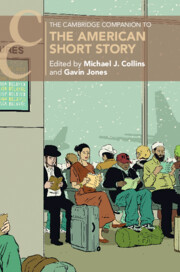Book contents
- The Cambridge Companion to the American Short Story
- The Cambridge Companion to the American Short Story
- Copyright page
- Contents
- Figures
- Tables
- Contributors
- Chronology
- Introduction
- Part I Contexts
- Part II Histories
- Part III People and Places
- Chapter 12 Native American Short Stories
- Chapter 13 African American Short Fiction
- Chapter 14 Little Postage Stamps
- Chapter 15 Regional Stories and the Environmental Imagination
- Chapter 16 Concrete Illuminations
- Part IV Theories
- Notes
- Further Reading
- Index
- Cambridge Companions to…
- References
Chapter 13 - African American Short Fiction
From Reform to Renaissance
from Part III - People and Places
Published online by Cambridge University Press: 11 May 2023
- The Cambridge Companion to the American Short Story
- The Cambridge Companion to the American Short Story
- Copyright page
- Contents
- Figures
- Tables
- Contributors
- Chronology
- Introduction
- Part I Contexts
- Part II Histories
- Part III People and Places
- Chapter 12 Native American Short Stories
- Chapter 13 African American Short Fiction
- Chapter 14 Little Postage Stamps
- Chapter 15 Regional Stories and the Environmental Imagination
- Chapter 16 Concrete Illuminations
- Part IV Theories
- Notes
- Further Reading
- Index
- Cambridge Companions to…
- References
Summary
This chapter details the literary history of short fiction written in English by African Americans from 1853 through 1934. Beginning in the antebellum era during the age of reform and continuing through the Postbellum–Pre-Harlem era before concluding with the Harlem Renaissance or New Negro Movement, this article traces the aims and goals of activists, artists, and reformers such as Frederick Douglass, Frances Ellen Watkins Harper, Alice Dunbar-Nelson, Paul Laurence Dunbar, Charles Chesnutt, Pauline Hopkins, Nella Larsen, Rudolph Fisher, Zora Neale Hurston, and Langston Hughes, contextualizing and contrasting their efforts to revise and critique the reductive depictions of African American life perceived within the dominant literary trends of their respective times.
Keywords
- Type
- Chapter
- Information
- The Cambridge Companion to the American Short Story , pp. 206 - 220Publisher: Cambridge University PressPrint publication year: 2023



